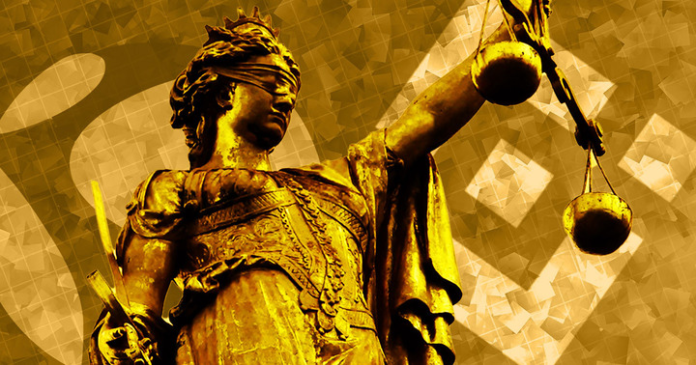A group of investors has filed a class-action lawsuit against Binance.US and its CEO for allegedly failing to comply with federal and state securities laws.
According to the filing, Binance.US falsely advertised UST, the algorithmic stablecoin tied to Terra’s LUNA, as a safe, stable, and fiat-backed asset, leading to “disastrous consequences” for its customers.
Binance’s US arm faces major class-action lawsuit
Binance.US has been accused of misleading investors and violating several federal and securities laws in the U.S. in a class-action lawsuit.
Filed on June 13, the lawsuit alleges that the exchange allowed U.S. residents to buy and sell TerraUSD (UST) without the approval of the U.S. Securities and Exchange Commission (SEC).
Plaintiffs accused Binance.US of failing to disclose that UST was, in fact, a security and that it was enabling the buying and selling of this security without a formal registration statement. In addition, Binance has refused to register with the SEC as a securities exchange or broker-dealer.
According to the filings:
“Binance.US’s failure to comply with the securities laws, and its false advertisement of UST, have led to disastrous consequences for [its] customers,”
While the exchange has delisted both UST and LUNA since Terra’s collapse in May, the plaintiffs claim that it still hasn’t stopped selling securities issued by Terraform Labs, Terra’s parent company. Instead, Binance.US’s parent company began selling Luna 2.0 at the end of May — a token hard forked from the original Terra (LUNA) that’s also centrally controlled y Terraform Labs.
Aside from failing to disclose that what it was selling was a security, Binance.US is also accused of misleading investors through false advertising. The plaintiffs claim that UST was advertised and sold to investors as a “safe” and “stable” asset that would give substantial returns.
The exchange also falsely advertised UST as “fiat-backed,” not informing its customers that the stablecoin algorithmically derived its peg from the price of LUNA.
I think Binance US forgot to take down this article (the main Binance scrubbed all similar claims). “UST is a stablecoin pegged 1:1 to the US Dollar” might get you in trouble, especially when tweeted from the Binance US account. Be careful. Lawyers smell blood… https://t.co/mbuEbYxKJ3 pic.twitter.com/oKCNSITUv6
— FatMan (@FatManTerra) May 22, 2022
“Since the collapse of UST, Binance U.S. has removed its advertisements touting UST as ‘safe’ and ‘fiat-backed, effectively conceding that UST was none of those things.”
The lawsuit against Binance.US will be the first of many
The class-action lawsuit was filed by Roche Freedman, a New York law office known for its controversial case against Craig Wright.
In an interview with CryptoSlate, FatManTerra said he helped the office gather a class of around 2,000 people that have suffered losses from UST’s collapse. He will continue to reach out to more investors that have suffered losses and connect them with law offices working on the case but won’t have any particular roles in the lawsuits.
While Roche Freedman could not be reached for comment, FatManTerra said the class-action suit against Binance.US will be the first of many that UST investors intend to file.
In the lawsuit against Binance.US, plaintiffs seek damages from the exchange for UST losses. FatManTerra said another class-action suit in the works will also seek restitution from Terraform Labs and Jump Crypto — one of Terra’s most prominent backers.
It’s unclear how the suit will affect Brian Shroder, the CEO of Binance.US, as he was named a defendant in the lawsuit alongside the exchange.
The trial will have long-lasting implications on the crypto industry. If successful, the lawsuit against Binance.US could set a precedent that would drastically alter the regulatory landscape in the U.S.
The SEC has long been seeking more control over the crypto market and warning investors about the risks and dangers involved with DeFi products. Having an exchange, the size of Binance.US lose a case for breaking securities laws could set off a ripple effect that could lead to a global overhaul of crypto regulations.
FatManTerra told CryptoSlate:
“People were roped in with siren calls of ‘safe, stable yields’ – but no attempt to help them actually understand what they were buying was made. This is morally unconscionable, and, in my opinion, it should be illegal.”
“In free markets, you can buy and sell whatever you like (fairly), but the moment you try to sell someone a copper bar claiming its gold, you will be penalized. It is a wonder to me that the same principles do not apply to centralized exchanges, who are supposed to operate under the rule of the law. Many exchanges are morally bankrupt and will lie for money at every turn – we need to take them to task and show them that when you prey on the innocent via misleading marketing, there are repercussions.”
Credit: Source link






















 Bitcoin
Bitcoin  Ethereum
Ethereum  XRP
XRP  Tether
Tether  Solana
Solana  USDC
USDC  Dogecoin
Dogecoin  Cardano
Cardano  Lido Staked Ether
Lido Staked Ether  TRON
TRON  Wrapped Bitcoin
Wrapped Bitcoin  Wrapped stETH
Wrapped stETH  Chainlink
Chainlink  Avalanche
Avalanche  Sui
Sui  Stellar
Stellar  Litecoin
Litecoin  Toncoin
Toncoin  Shiba Inu
Shiba Inu  Hedera
Hedera  LEO Token
LEO Token  USDS
USDS  Hyperliquid
Hyperliquid  Polkadot
Polkadot  WETH
WETH  MANTRA
MANTRA  Bitcoin Cash
Bitcoin Cash  Bitget Token
Bitget Token  Ethena USDe
Ethena USDe  Wrapped eETH
Wrapped eETH  Uniswap
Uniswap  Monero
Monero  NEAR Protocol
NEAR Protocol  Pepe
Pepe  WhiteBIT Coin
WhiteBIT Coin  Aave
Aave  Bittensor
Bittensor  Ondo
Ondo  Aptos
Aptos  Internet Computer
Internet Computer  Dai
Dai  Official Trump
Official Trump  Ethereum Classic
Ethereum Classic  Mantle
Mantle  Tokenize Xchange
Tokenize Xchange  OKB
OKB  Gate
Gate  sUSDS
sUSDS  Coinbase Wrapped BTC
Coinbase Wrapped BTC 
